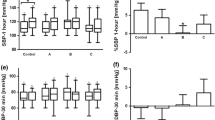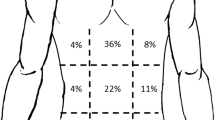Abstract
Anecdotes and animal experiments alike suggest that physiological and psychological stress can profoundly alter gastrointestinal function. However, few studies have examined, in humans, real-world stress to see if free-living persons exhibit gut alterations similar to those produced in the laboratory. To investigate this possibility, we studied 16 medical and premedical students during final written examinations. As compared to a control day, the examination created a classic stress response: elevated serum cortisol (16±1 to 21±3 µg/dl;P<0.05), ACTH (31±1 to 33±1 pg/ml;P<0.05), heart rate (72±3 to 79±3 beats/min;P<0.05), arterial blood pressure (systolic pressure 106±2 to 120±2 torr;P<0.05; diastolic pressure 72±2 to 77±1 torr;P<0.05), and subjective anxiety (raw score 28±2 to 47±3;P<0.0001). In contrast, subjects displayed identical orocecal liquid transit time (of 0.36 g/kg lactulose in a 240-ml, 250-kcal liquid meal) under control (103±8 min) and examination conditions (106±8 min;P=NS). Mean subjective reports of gas, diarrhea, and borborygmi were unchanged on the day of the experiment, although the examination did increase reported abdominal pain (from 0.5±0.4 to 2.1±0.5 on a 0–5 analog scale;P<0.05). We conclude that examination stress in humans can increase gastrointestinal symptoms without altering orocecal transit.
Similar content being viewed by others
References
Ganong WF:In Catecholamines and Stress: Recent Advances. E Usdin, R Kvetnansky, IJ Kopin (eds). New York, Elsevier/North-Holland, 1980, p 585
Cannon WB, de la Paz D: Emotional stimulation of adrenal secretion. Am J Physiol 28:64–70, 1911
Berman AJ: Stress and the gastrointestinal tract. Mt Sinai J Med 54:66–77, 1987
Barone FC, Deegan JF, Price WJ, Fowler PJ, Fondacaro JD, Ormsbec HS III: Cold-restraint stress increases rat fecal pellet output and colonic transit. Am J Physiol 258:G329-G337, 1990
O'Brien JD, Thompson DG, Burnham WR, Holly J, Walker E: The action of centrally mediated autonomic stimulation on human upper gastrointestinal transit: a comparative study of two stimuli. Gut 28:260–269, 1987
Stanghellini V, Malagelada J-R, Zinsmeister AR, Go VLW, Kao PC: Effect of opiate and adrenergic blockers on the gut motor response to centrally acting stimuli. Gastroenterology 87:1104–1113, 1984
Bond JH, Levitt MD: Investigation of small bowel transit time in man utilizing pulmonary hydrogen (H2) measurements. J Lab Clin Med 85:546–555, 1975
Staniforth DH, Rose D: Statistical analysis of the lactulose breath hydrogen test in the measurement of orocecal transit: Its variability and predictive value in assessing drug action. Gut 30:171–175, 1989
Spielberger DC: Manual for the State-Trait Anxiety Inventory. Palo Alto, Consulting Psychologists Press, 1983
Anderson NB: Racial differences in stress-induced cardiovascular reactivity and hypertension: Current status and substantive issues. Psychol Bull 105:89–105, 1989
Diop L, Pascaud X, Junien JJ, Buéno L: CRF triggers the CNS release of TRH in stress induced changes in gastric emptying. Am J Physiol 260:G39-G44, 1991
Gue M, Junien JL, Bueno L: Conditioned emotional response in rats enhances colonic motility through the central release of corticotropin-releasing factor. Gastroenterology 100:964–970, 1991
Lenz HJ: Neurohumoral pathways mediating stress-induced changes in rat gastrointestinal transit. Gastroenterology 97:216–218, 1989
Lenz HJ: Regulation of duodenal bicarbonate secretion during stress by corticotropin-releasing factor and β-endorphin. Proc Natl Acad Sci USA 86:1417–1420, 1989
Lenz HJ, Raedler A, Greten H, Brown MR: CRF initiates biological actions within the brain that are observed in response to stress. Am J Physiol 252:R34-R39, 1987
O'Brien JD, Thompson DG, Day SJ, Burnham WR, Walker E: Perturbation of upper gastrointestinal transit and antroduodenal motility by experimentally applied stress: The role of beta-adrenoreceptor mediated pathways. Gut 30:1530–1539, 1989
Williams CL, Villar RG, Peterson JM, Burks TF: Stressinduced changes in intestinal transit in the rat: A model for irritable bowel syndrome. Gastroenterology 94:611–621, 1988
Empey LR, Fedorak RN: Effect of misoprostol in preventing stress-induced intestinal fluid secretion in rats. Prostaglandins Leukotrienes Essent Fatty Acids 38:43–48, 1989
Barclay GA, Turnberg LA: Effect of psychological stress on salt and water transport in the human jejunum. Gastroenterology 93:91–97, 1987
Cann PA, Read NW, Cammack J, Childs H, Holden S, Kashman R, Longmore J, Nix S, Simms N, Swallow K, Weller J: Psychological stress and the passage of a standard meal through stomach and small intestine in man. Gut 24:236–240, 1983
McRae S, Younger K, Thompson DG, Wingate DL: Sustained mental stress alters human jejunal motor activity. Gut 23:404–409, 1982
Holtmann G, Singer MV, Kriebel R, Stäcker KH, Goebell H: Differential effects of acute mental stress on interdigestive secretion of gastric acid, pancreatic enzymes, and gastroduodenal motility. Dig Dis Sci 34:1701–1707, 1989
Valori RM, Kumar D, Wingate DL: Effects of different kinds of stress and “prokinetic” drugs on the control of the fasting motor complex in humans. Gastroenterology 90:1890–1900, 1986
Barclay GR, Turnberg LA: Effect of cold-induced pain on salt and water transport in the human jejunum. Gastroenterology 94:994–998, 1988
Kendall GPN, Thompson DG, Day SJ, Lennard-Jones JE: Inter-and intraindividual variation in pressure-volume relations of the rectum in normal subjects and patients with the irritable bowel syndrome. Gut 31:1062–1068, 1990
Whitehead WE, Holtkotter B, Enckn P, Hoelzl R, Holmes KD, Anthony J, Shabsin HS, Shuster MM: Tolerance for rectosigmoid distention in irritable bowel syndrome. Gastroenterology 98:1187–1192, 1990
Author information
Authors and Affiliations
Rights and permissions
About this article
Cite this article
Harris, A., Martin, B.J. Increased abdominal pain during final examinations. Digest Dis Sci 39, 104–108 (1994). https://doi.org/10.1007/BF02090068
Received:
Revised:
Accepted:
Issue Date:
DOI: https://doi.org/10.1007/BF02090068




